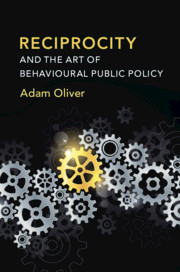
-
Select format
-
- Publisher:
- Cambridge University Press
- Publication date:
- July 2019
- July 2019
- ISBN:
- 9781108647755
- 9781108480208
- 9781108727143
- Dimensions:
- (228 x 152 mm)
- Weight & Pages:
- 0.47kg, 208 Pages
- Dimensions:
- (228 x 152 mm)
- Weight & Pages:
- 0.36kg, 208 Pages
You may already have access via personal or institutional login
Book description
What motivates human behaviour? Drawing on literatures from anthropology to zoology, Oliver examines how we are motivated to give and take, rather than give or take. This book reviews the evolution of reciprocity as a motivator of behaviour, in terms of its observation in non-human species, in very young humans, and in societies that we can reasonably expect are similar to those in which our distant ancestors lived. The behavioural economic and social psychology literature that aims to discern when and in what circumstances reciprocity is likely to be observed and sustained is also reviewed, followed by a discussion on whether reciprocity is relevant to both the economic and the social domains. The dark sides of reciprocity are considered, before turning again to the light, and how the potentially beneficial effects of reciprocity might best be realised. This culminates in the presentation of a new political economy of behavioural public policy, with reciprocity playing a prominent role.
Reviews
‘In his exciting new book, Adam Oliver describes the part played by reciprocity in making us human, and how public policy should encourage and harvest it to enhance all our lives.'
George Akerlof - 2001 Nobel Laureate in Economics
‘Adam Oliver is one of the leaders in the new field of behavioural public policy. In this important book, he marshals the evidence that reciprocity is a fundamental human motivation. He uses this idea as the starting point for a new way of thinking about public policy. His insight is that providers of public sector services and the taxpayers who fund these services are neither self-interested ‘knaves' nor altruistic ‘knights': they are reciprocators.'
Robert Sugden - University of East Anglia
'A true tour de force - public policy will never be the same. I have been working to improve public policies for twenty-five years and this tome radically transformed my notions of rights, wrongs, and what can work.'
John A. List - Kenneth C. Griffin Distinguished Service Professor in Economics, University of Chicago
'A brilliant, clarifying treatment of one of the largest issues in all of social science, and indeed human life. Why do people act fairly? What does that even mean? Oliver's book is essential reading - it's deep, and it's lively and fun to boot.'
Cass R. Sunstein - Robert Walmsley University Professor, Harvard University, and co-author of Nudge
‘… this theoretically inclined treatise can profitably serve as a supplemental text in courses on political theory.’
D. L. Feldman Source: Choice
Contents
Metrics
Altmetric attention score
Full text views
Full text views help Loading metrics...
Loading metrics...
* Views captured on Cambridge Core between #date#. This data will be updated every 24 hours.
Usage data cannot currently be displayed.
Accessibility standard: Unknown
Why this information is here
This section outlines the accessibility features of this content - including support for screen readers, full keyboard navigation and high-contrast display options. This may not be relevant for you.
Accessibility Information
Accessibility compliance for the PDF of this book is currently unknown and may be updated in the future.


